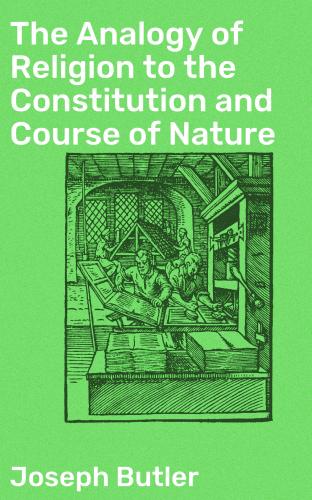Let us then, instead of that idle and not very innocent employment of forming imaginary models of a world, and schemes of governing it, turn our thoughts to what we experience to be the conduct of nature with respect to intelligent creatures; which may be resolved into general laws or rules of administration, in the same way as many of the laws of nature respecting inanimate matter may be collected from experiments. Let us compare the known constitution and course of things with what is said to be the moral system of nature; the acknowledged dispensations of Providence, or that government which we find ourselves under, with what religion teaches us to believe and expect; and see whether they are not analogous and of a piece. Upon such a comparison it will, I think, be found that they are very much so: that both may be traced up to the same general laws, and resolved into the same principles of divine conduct.
The analogy here proposed to be considered is of pretty large extent, and consists of several parts; in some more, in others less exact. In some few instances perhaps, it may amount to a real practical proof; in others not so. Yet in these it is a confirmation of what is proved otherwise. It will undeniably show, what too many need to have shown them, that the system of religion, both natural and revealed, considered only as a system, and prior to the proof of it, is not a subject of ridicule, unless that of nature be so too. And it will afford an answer to almost all objections against the system both of natural and revealed religion; though not perhaps an answer in so great a degree, yet in a very considerable degree an answer to the objections against the evidence of it: for objections against a proof, and objections against what is said to be proved, the reader will observe are different things.
The divine government of the world, implied in the notion of religion in general and of Christianity, contains in it: that mankind is appointed to live in a future state;[13] that there every one shall be rewarded or punished;[14] rewarded or punished respectively for all that behaviour here, which we comprehend under the words, virtuous or vicious, morally good or evil:[15] that our present life is a probation, a state of trial,[16] and of discipline,[17] for that future one; notwithstanding the objections, which men may fancy they have, from notions of necessity, against there being any such moral plan as this at all;[18] and whatever objections may appear to lie against the wisdom and goodness of it, as it stands so imperfectly made known to us at present:[19] that this world being in a state of apostasy and wickedness, and consequently of ruin, and the sense both of their condition and duty being greatly corrupted amongst men, this gave occasion for an additional dispensation of Providence; of the utmost importance;[20] proved by miracles;[21] but containing in it many things appearing to us strange, and not to have been expected;[22] a dispensation of Providence, which is a scheme or system of things;[23] carried on by the mediation of a divine person, the Messiah, in order to the recovery of the world;[24] yet not revealed to all men, nor proved with the strongest possible evidence to all those to whom it is revealed; but only to such a part of mankind, and with such particular evidence, as the wisdom of God thought fit.[25]
The design then of the following treatise will be to show, that the several parts principally objected against in this moral and Christian dispensation, including its scheme, its publication, and the proof which God has afforded us of its truth; that the particular parts principally objected against in this whole dispensation, are analogous to what is experienced in the constitution and course of nature or Providence; that the chief objections themselves which are alleged against the former, are no other than what may be alleged with like justness against the latter, where they are found in fact to be inconclusive; and that this argument from analogy is in general unanswerable, and undoubtedly of weight on the side of religion,[26] notwithstanding the objections which may seem to lie against it, and the real ground which there may be for difference of opinion, as to the particular degree of weight which is to be laid upon it. This is a general account of what may be looked for in the following treatise. I shall begin it with that which is the foundation of all our hopes and of all our fears; all our hopes and fears, which are of any consideration; I mean a future life.
Конец ознакомительного фрагмента.
Текст предоставлен ООО «ЛитРес».
Прочитайте эту книгу целиком, купив полную легальную версию на ЛитРес.
Безопасно оплатить книгу можно банковской картой Visa, MasterCard, Maestro, со счета мобильного телефона, с платежного терминала, в салоне МТС или Связной, через PayPal, WebMoney, Яндекс.Деньги, QIWI Кошелек, бонусными картами или другим удобным Вам способом.
